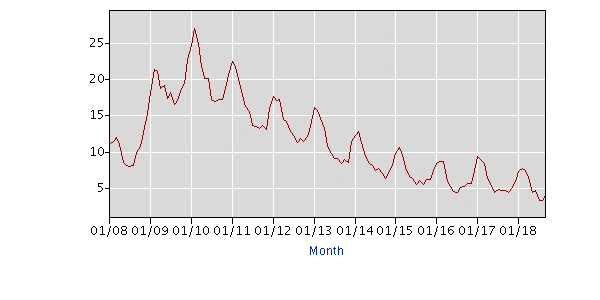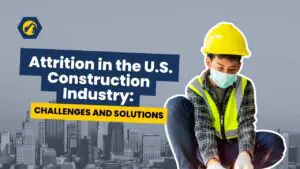
With the unemployment rate dipping as low as 3.4% this summer it is harder than ever to find and successfully onboard the top 20% of the workforce. Getting talented candidates to engage in the interview process is becoming more difficult which is why once you have identified a potential candidate it is important to not make these common mistakes throughout the interview process.
Data extracted on: October 7, 2018 (1:09:43 PM)
Labor Force Statistics from the Current Population Survey
Unemployment % Rate – Construction Industry, Private Wage and Salary Workers

1. Don’t Let Resumes Collect Dust

This may seem like common sense, but what we are finding is that most candidates that apply for positions posted online are not qualified. This leaves both qualified and unqualified candidates resumes piled up in an email inbox or on someone’s desk. That someone has other work to do and more often than not does not prioritize the time required to sift through all of the applicants to determine which applicants should be contacted regarding the position.
A quick turn around time is important. Qualified candidates need to be courted and done so in an expedient way. It gives the candidate a sense of importance and being wanted which can be helpful to getting the candidate committed to the interview process.
Also, good candidates especially those who are motivated are applying to multiple positions and may often receive multiple offers during their interview process.
Whether the resume comes from a trusted recruiter, and internal referral, or an online posting as soon as it comes to the company’s attention the clock is ticking and the possibility of other companies’ interest and engagement increases.
2. Initial Contact/Setting the Interview
Initial contact is critical. I strongly encourage that the initial contact with the candidate be made quickly and by someone in the company that would likely be a direct supervisor of the candidate. The higher up the corporate ladder the person is the better. A candidate is much more likely to respond favorably to a potential manager than a peer or even a human resource professional.
I believe that there is great value in the Human Resource Department being part of the overall process, however, I have seen dozens of fantastic middle and executive management candidates be turned off by the initial contact being that of a junior human resource generalist or internal recruiter who does not have the depth on knowledge or understanding of the industry or work as the candidate does.
Being contacted by a potential manager or senior executive gives the candidate a sense of being wanted and valued. Upon initial contact, voice excitement about the candidate and try to relate to the candidate. I encourage saying things such as;
“We were really excited when we saw your resume and wanted to reach out to you immediately.”
“We believe that your experience in ___________ can help us with this division and reaching our company’s goals.”
Statements such as these can help engage the candidate. Also, make sure to have the calendar dates ready to schedule the first interview during that first contact to expedite the process.
Things to consider: What if everyone on your team is not available for another month? Break the interview process up. Try to get them in the door as quickly as possible even if the overall process takes a while.
3. “Sell, Sell, Sell….” Market Your Company and the Opportunity
The days of “my company has a great reputation and candidates should want to come to work for me,” are over unless you are the Google of construction.
Market your company. What is your culture like? Be specific. Telling someone that you are a family-oriented company doesn’t really define much these days. What makes it family oriented? Why do people like working there? What aspects or benefits separate your company from the industry norm? What is the business plan for the company for 2, 5, & 10 years? What type of succession plan is in place for the company?
This also ties into marketing the opportunity for the candidate. Most candidates are looking for a way to advance their career. Usually the best candidates are not satisfied with a lateral move. If they are considering a lateral move they tend to want to know what career advancement is available to them from the position that they are being considered and what that time frame may look like. Discuss employee evaluations and the time frames for those evaluations. What can the candidate expect from a favorable evaluation? A raise? A bonus? A promotion?
4. The Personal and/or Family Dynamic
Gaining an understanding of the candidates reasons for making a career move are rarely driven only by professional reasons. For this reason, it is essential to get to know the candidate on a personal level. What personal factors may affect his ability to be a good fit for the role and effect such things as travel, commuting tolerance to projects or office, and relocation (if required).
I strongly advise to ask candidates in relationships to speak with their partner or wife about the career move and follow up on that conversation. Especially for relocations and upper level executives I encourage to get the spouse involved in a dinner meeting or something of that nature where she can meet other members of the employer’s family. Very rarely does one make a big decision regarding their career without the advice or consul of their spouse. I have seen many offers declined for that exact reason.
5. Make an Initial Competitive Offer
I would propose that the second contributing factor to seeing companies lose good candidates is not making a competitive offer. It may be that they are unsure what an offer needs to be to be competitive. During the later part of the interview process it may be helpful to have a candidate fill out a comprehensive compensation form. Items like differences in insurance premiums and deductibles can significantly affect what an acceptable base salary might be. Perhaps a candidate is unwilling to budge on giving up his 4 weeks of vacation that he has earned over the years and that alone could result in a declined offer. It may be that someone’s current employer has an unbelievable 401k matching or profit-sharing plan. I believe that having an understanding of these factors can help you put forward a competitive offer right out of the gate.
I also think it is very helpful to call the candidate and discuss the offer directly and how the offer came to be instead of sending an email. It could be that the company policy affects an aspect of the offer such as vacation or bonus. Ask the candidate for their thoughts after review of the offer. In my experience it is rare that the initial offer is completely acceptable to the candidate without discussion. That being said, putting a competitive initial offer together reduces the chances that the offer is so far apart from the candidate’s expectations that the candidate ends the negotiation process.
Following these five tips can help ensure that you are onboarding the best talent that is available to you. For more tips or advice on hiring the best talent in the construction industry see our other blogs or give us a call at (828) 515-4272 Ext. 1.
By Taylor Maurer
Taylor Maurer runs the talent acquisition firm HCRC as senior managing partner. He is a professional heavy civil construction recruiter dedicated to attracting and retaining high quality talent.






